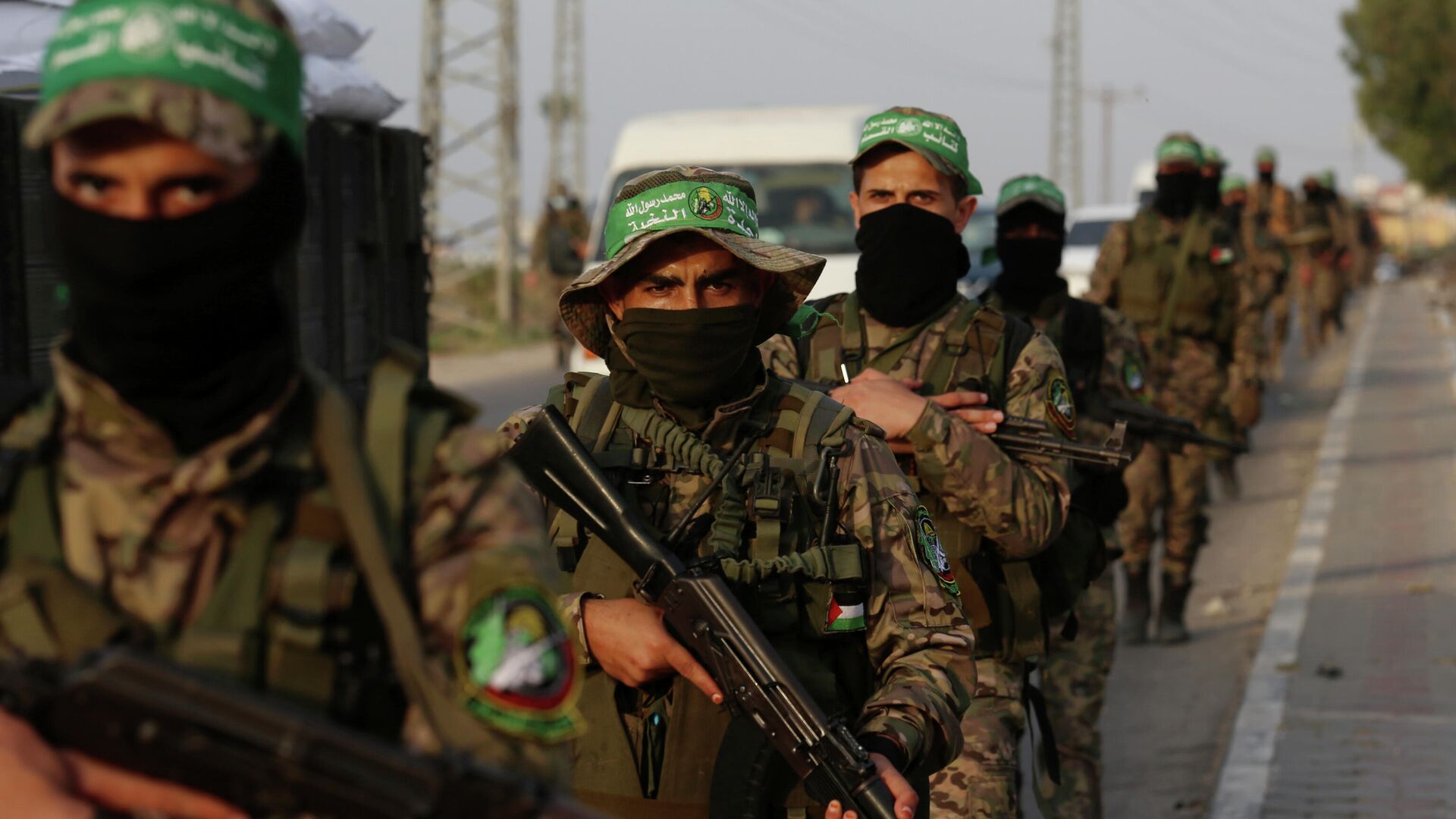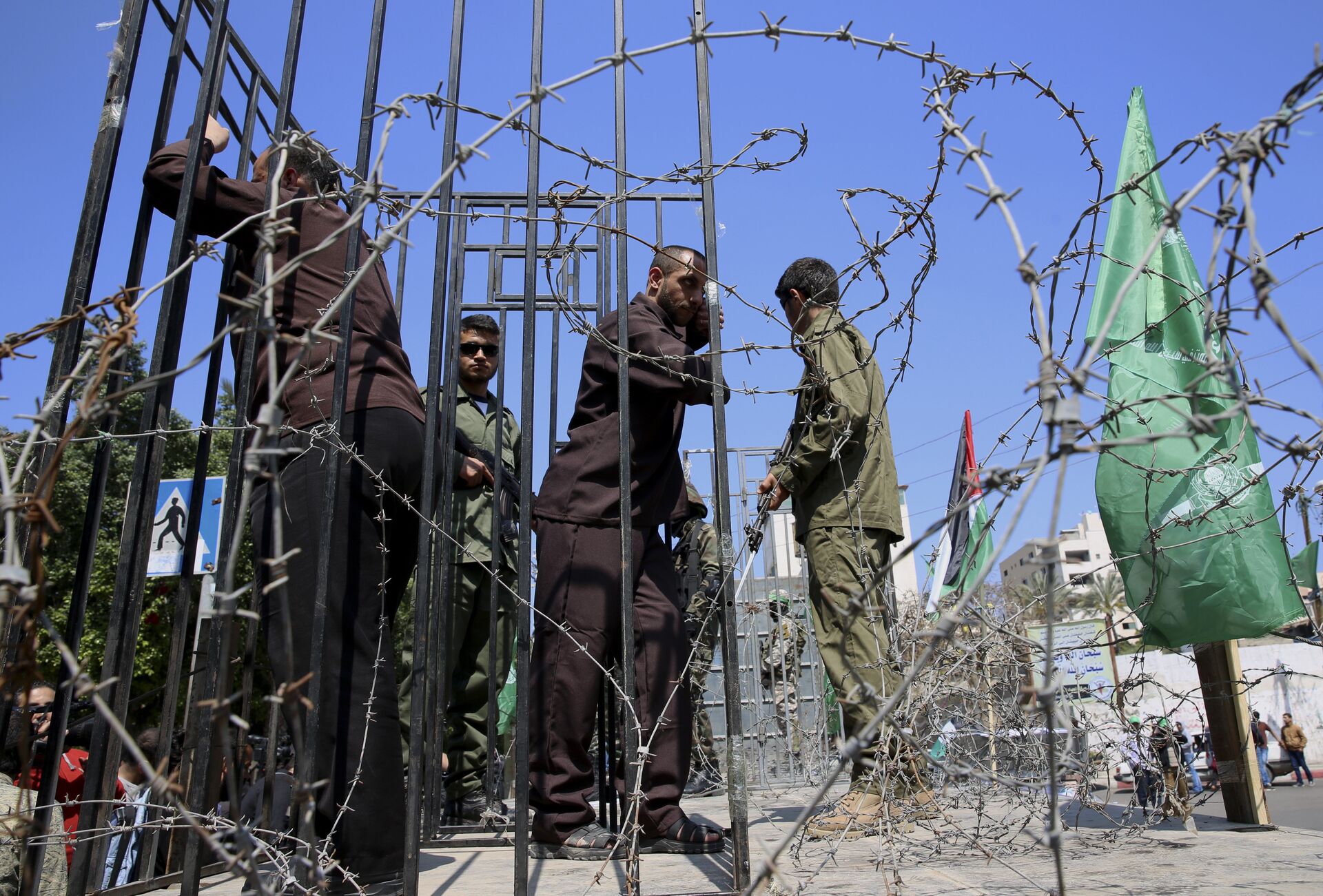https://sputnikglobe.com/20220725/another-swap-deal-between-israel--hamas-1097758525.html
Another Swap Deal Between Israel & Hamas?
Another Swap Deal Between Israel & Hamas?
Sputnik International
Hamas demands the release of 1,111 Palestinian prisoners in exchange for the bodies of two Israeli soldiers, who died during the 2014 operation Protective... 25.07.2022, Sputnik International
2022-07-25T06:54+0000
2022-07-25T06:54+0000
2023-01-15T17:26+0000
hamas
palestinians
prisoner swap
middle east
israel
https://cdn1.img.sputnikglobe.com/img/07e5/0b/13/1090853729_0:152:3072:1880_1920x0_80_0_0_0388d731830f1ff979af044ee7e01db7.jpg
Last week, Hamas, an Islamic group that controls the Gaza Strip, said that Israel will not get to see the two soldiers held by the movement unless it "pays a price".Israel believes Hamas is holding the bodies of two slain soldiers: Oron Shaul and Hadar Goldin, both of whom died in 2014 amid the Jewish state's operation in Gaza, Protective Edge. Negotiations regarding their condition, including through Egyptian mediators, have repeatedly hit a brick wall.High DemandsAshraf Al Ajrami, a former Palestinian official, who served as a minister of Palestinian prisoners' affairs, says Hamas doesn't want to release any information about the state of Israeli captives without getting anything in return from the Jewish state.So far, Israel hasn't budged regarding those conditions. Meanwhile, talks revolving around the return of the two soldiers' bodies have also been stalled, with no progress in sight.The reason for this, says Al Ajrami, is the inability of Hamas and Israel to reach an agreement on the number of Palestinian prisoners that would be freed from Israeli prisons.In 2011, Israel retrieved a captured soldier, Gilad Shalit, in a swap for more than a thousand Palestinian inmates. Many of them were serving life sentences in Israeli prisons on charges of terrorism.This time around, Hamas wants to repeat the success of the past and insists on releasing 1,111 prisoners, including the so-called "heavy" ones such as members of the Izz Ad-Din Al Qassam Brigades, the military wing of the Islamic group. Israel is reluctant to do so, primarily because many of the prisoners it freed in 2011 have returned to their terrorist activity, presenting a threat to society.But Al Ajrami says there's also a political reason.Possible Deal Looming?However, reports suggest that some are trying. In mid-July it was reported that Prime Minister Yair Lapid was holding "advanced talks" with Hamas aiming to reach a deal before the Israeli elections set to be held on November 1.An Egyptian source, who spoke to Sputnik on condition of anonymity, denied that advanced talks were taking place, and Al Ajrami says "an interim Israeli government cannot take such a step."To appease Hamas, the current Israeli government is more likely to take humanitarian or economic steps to ease the suffering of the 2.3 million Gazans, believes the former minister. However, big diplomatic decisions are not on the table, he reassures.
israel
Sputnik International
feedback@sputniknews.com
+74956456601
MIA „Rosiya Segodnya“
2022
News
en_EN
Sputnik International
feedback@sputniknews.com
+74956456601
MIA „Rosiya Segodnya“
Sputnik International
feedback@sputniknews.com
+74956456601
MIA „Rosiya Segodnya“
hamas, palestinians, prisoner swap, middle east, israel
hamas, palestinians, prisoner swap, middle east, israel
Another Swap Deal Between Israel & Hamas?
06:54 GMT 25.07.2022 (Updated: 17:26 GMT 15.01.2023) Hamas demands the release of 1,111 Palestinian prisoners in exchange for the bodies of two Israeli soldiers, who died during the 2014 operation Protective Edge. Israel rejects such demands, primarily because it fears the terrorist threat these inmates might cause.
Last week, Hamas, an Islamic group that controls the Gaza Strip, said that Israel will not get to see the two soldiers held by the movement
unless it "pays a price".Israel believes Hamas is holding the bodies of two slain soldiers: Oron Shaul and Hadar Goldin, both of whom died in 2014 amid the Jewish state's operation in Gaza, Protective Edge. Negotiations regarding their condition, including through Egyptian mediators, have repeatedly hit a brick wall.
Ashraf Al Ajrami, a former Palestinian official, who served as a minister of Palestinian prisoners' affairs, says Hamas doesn't want to release any information about the state of Israeli captives without getting anything in return from the Jewish state.
"Hamas made it clear that if Israel wanted to receive any information regarding its soldiers it needed to pay a price. By price they mean the release of children, who are kept in Israeli prisons, women and sick people, or those inmates who were rearrested after their 2011 release [following the Gilad Shalit swap deal - ed.]"
So far, Israel hasn't budged regarding those conditions. Meanwhile, talks revolving around the return of the two soldiers' bodies have also been stalled, with no progress in sight.
The reason for this, says Al Ajrami, is the inability of Hamas and Israel to reach an agreement on the number of Palestinian prisoners that would be freed from Israeli prisons.
In 2011, Israel retrieved a captured soldier, Gilad Shalit, in a swap for more than a thousand Palestinian inmates. Many of them were serving life sentences in Israeli prisons on charges of terrorism.
This time around, Hamas wants to repeat the success of the past and insists on releasing 1,111 prisoners, including the so-called "heavy" ones such as members of the Izz Ad-Din Al Qassam Brigades, the military wing of the Islamic group. Israel is reluctant to do so, primarily because many of the prisoners it freed in 2011
have returned to their terrorist activity, presenting a threat to society.
But Al Ajrami says there's also a political reason.
"It will be catastrophic for any government [to agree to these terms - ed.] because these prisoners are accused of killing dozens of Israelis. No Israeli government will want to pay this heavy price. No politician will agree to that."
However, reports suggest that some are trying. In mid-July it was reported that Prime Minister
Yair Lapid was holding "advanced talks" with Hamas aiming to reach a deal before the Israeli elections set to be held on November 1.
An Egyptian source, who spoke to Sputnik on condition of anonymity, denied that advanced talks were taking place, and Al Ajrami says "an interim Israeli government cannot take such a step."
"It'll be totally catastrophic for them and it will lower their chances to be re-elected, as the right-wing elements will use this against them. Simply put, they won't have the courage to do so."
To appease Hamas, the current Israeli government is more likely to take humanitarian or economic steps to ease the suffering of the 2.3 million Gazans, believes the former minister. However, big diplomatic decisions are not on the table, he reassures.




